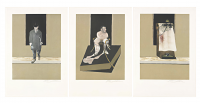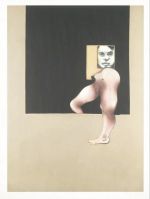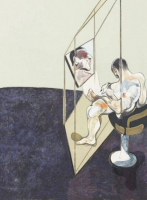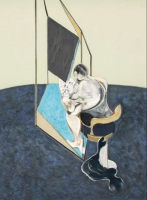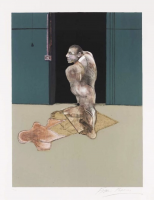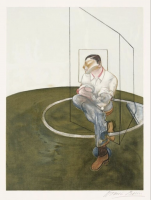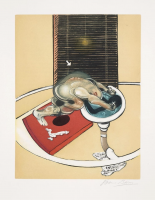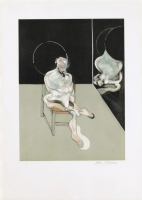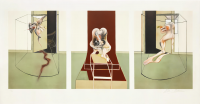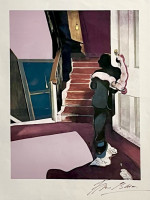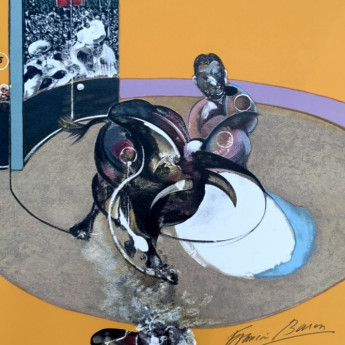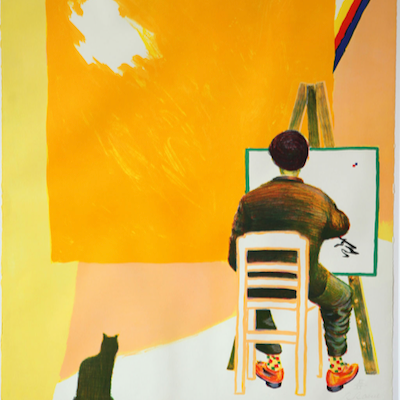
Details
Artist
Styles
Lithograph on pale cream wove Arches paper, with Arches watermark - Printed by Arts Litho, Paris. With their blind stamp, lower left - Published by Éditions de la Différence, Paris, 1984 - Dimensions: - Image: 1170 x 860 mm. - Sheet: 1277 x 895 mm. - Signed in pencil, lower right - Catalogue raisonné: - Sabatier, Francis Bacon: The Graphic Work, no. 18 - Tacou, Francis Bacon: Estampes, no.17 // Francis Bacon’s Oedipus and the Sphinx (1984) is a striking lithograph that reinterprets the classic Greek myth with his signature intensity. Printed on pale cream Arches paper, the piece depicts a dramatic encounter between the figures of Oedipus and the Sphinx in a distorted, claustrophobic interior space. Bacon’s characteristic use of blurred and deformed forms evokes a sense of violence and psychological turmoil, emphasizing the existential struggle inherent in the myth. The pink and brown palette contrasts sharply with the fleshy tones and visceral details, such as the red markings on the figures. This limited edition lithograph, printed by Arts Litho, Paris, and published by Éditions de la Différence, highlights Bacon’s mastery in creating a visual tension that confronts the viewer with themes of fate, identity, and conflict.
Oedipus and the Sphinx, 1984
form
Medium
Size
127.7 x 89.5 cm
- Inches
- Centimeters
Edition
Price
Details
Artist
Styles
Lithograph on pale cream wove Arches paper, with Arches watermark - Printed by Arts Litho, Paris. With their blind stamp, lower left - Published by Éditions de la Différence, Paris, 1984 - Dimensions: - Image: 1170 x 860 mm. - Sheet: 1277 x 895 mm. - Signed in pencil, lower right - Catalogue raisonné: - Sabatier, Francis Bacon: The Graphic Work, no. 18 - Tacou, Francis Bacon: Estampes, no.17 // Francis Bacon’s Oedipus and the Sphinx (1984) is a striking lithograph that reinterprets the classic Greek myth with his signature intensity. Printed on pale cream Arches paper, the piece depicts a dramatic encounter between the figures of Oedipus and the Sphinx in a distorted, claustrophobic interior space. Bacon’s characteristic use of blurred and deformed forms evokes a sense of violence and psychological turmoil, emphasizing the existential struggle inherent in the myth. The pink and brown palette contrasts sharply with the fleshy tones and visceral details, such as the red markings on the figures. This limited edition lithograph, printed by Arts Litho, Paris, and published by Éditions de la Différence, highlights Bacon’s mastery in creating a visual tension that confronts the viewer with themes of fate, identity, and conflict.
- Recently Added
- Price (low-high )
- Price (high-low )
- Year (low-high )
- Year (high-low )
Francis Bacon
Three Studies For Figures At The Base Of A Crucifixion, 2005
Limited Edition Print
Giclée Printing
GBP 40,000 - 50,000
Francis Bacon
Three Studies Of Male Back (One Work - Right Hand Panel Of The Triptych), 1987
Limited Edition Print
Lithograph
Inquire For Price
Francis Bacon
Three Studies Of Male Back (One Work - Central Panel Of The Triptych), 1987
Limited Edition Print
Lithograph
GBP 18,000 - 22,000
Francis Bacon
Study For A Portrait Of John Edwards (s.9495), 1986
Limited Edition Print
Lithograph
GBP 17,000 - 20,000
Francis Bacon
Study For A Portrait Of John Edwards, 1988
Limited Edition Print
Lithograph
GBP 18,000 - 25,000
Francis Bacon
L’Homme Au Lavabo Figure At A Washbasin, 1978
Limited Edition Print
Etching And Aquatint
GBP 19,000 - 23,000
Francis Bacon
Triptych, March 1974 ( Centre Panel ), 1978
Limited Edition Print
Offset Print
EUR 15,450
Francis Bacon
Study For Portrait Of Pope Innocent X After Velasquez, 1989
Limited Edition Print
Lithograph
EUR 60,000 - 70,000
Francis Bacon
Three Studies For A Portrait Of John Edwards, 1980
Limited Edition Print
Lithograph
EUR 57,000 - 70,000
Francis Bacon
Seated Figure, 1983
Limited Edition Print
Etching And Aquatint
Currently Not Available
Francis Bacon
Triptych Inspired By Oresteia Of Aeschylus (s.9503), 1981
Limited Edition Print
Lithograph
Currently Not Available
Francis Bacon
Triptych, 1974-1977
Limited Edition Print
Etching And Aquatint
Currently Not Available
What is new figuration?
Neo-Figurative Art is a collective term that refers to the revival of figurative art in America and Europe during the 1960s, following a period dominated by abstraction. Michel Ragon, a French art critic, argued that this resurgence of figuration occurred during a critical time of social and political upheaval in both regions.




